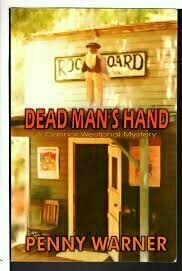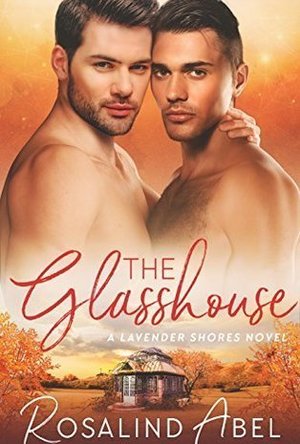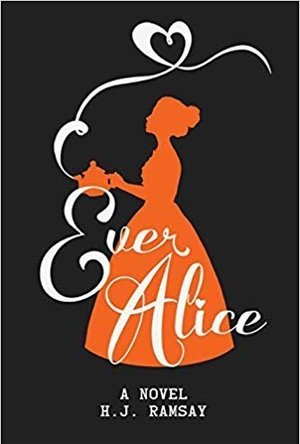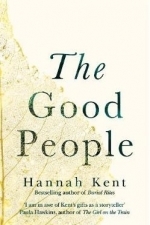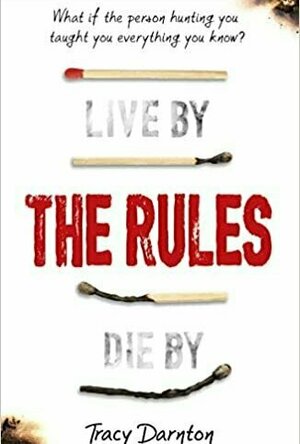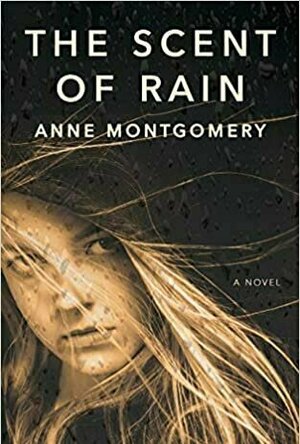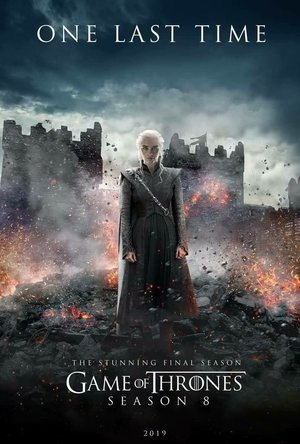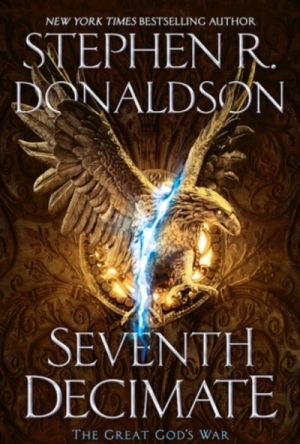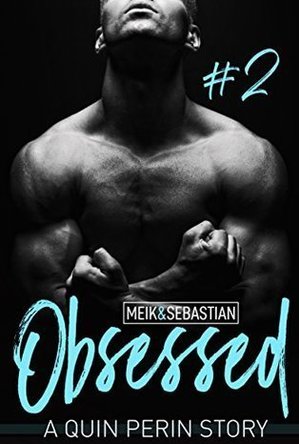Search
Search results
Mark @ Carstairs Considers (2478 KP) rated Dead Man's Hand in Books
Nov 29, 2023 (Updated Nov 29, 2023)
The Chip in the Dead Man’s Hand
The cold, snowy weather that Flat Skunk, California is having this January doesn’t hide a dead body, especially since the body is found hanging in front of one of the stores in town. While it would be easy to rule it an obvious suicide, the sheriff finds evidence that leads him to believe it is murder. Naturally, Connor Westphal sees the chance to get a big news story for her paper, but she can’t get a handle on the story. What is the meaning of the chip from the nearby Indian casino found in the victim’s hand? Or does the victim’s drug dealing have anything to do with his death?
This book didn't have quite the feel of the other books in the series, and some of the regulars were absent or weren't around much. Having said that, I did still enjoy seeing Connor one last time. She makes an interesting and strong main character. I also enjoyed getting to see more of her service dog. The plot was strong and I didn't see the ending coming at all. I enjoyed seeing how things had changed for deaf people even in the short time between when the series started and this book, which came out in 2007. There is much more foul language than is typical for a cozy. This is the final book in the series, and I really liked where Connor wound up. I'm sure that other fans of the series will be happy as well.
This book didn't have quite the feel of the other books in the series, and some of the regulars were absent or weren't around much. Having said that, I did still enjoy seeing Connor one last time. She makes an interesting and strong main character. I also enjoyed getting to see more of her service dog. The plot was strong and I didn't see the ending coming at all. I enjoyed seeing how things had changed for deaf people even in the short time between when the series started and this book, which came out in 2007. There is much more foul language than is typical for a cozy. This is the final book in the series, and I really liked where Connor wound up. I'm sure that other fans of the series will be happy as well.
Debbiereadsbook (1650 KP) rated The Glasshouse (Lavender Shores #6) in Books
Apr 24, 2018
love love LOVE this series!
Independent reviewer for Archaeolibrarian, I was gifted my copy of this book.
This is book 6 in the series, but you don't need to have read there other books to follow this one. They can all be read as stand alones. But they are all 4 and 5 star reviews, from me!
I keep flipping from 4 to 5 stars and back to four again, and I have no idea why I keep crossing the numbers out at the top of the page, so gonna split the difference and call it 4.5 stars, rounded up to 5 for the blog!
A little bit more of an emotional read, this one. I felt for Harrison, I really did. I cried for him when he runs, first from Will then from Adrian. And cheered for him when he finds himself, after being someone else for everyone for so very long.
But equally, Adrian wrecks your heart too! While he fights for what he feels for Harrison in the beginning, then letting it all out and going all in, and when he was waiting for Harrison to come back to him. Oh Lord, the waiting was painful!
Harrison's brother Jasper plays a huge part here, and I think he should get a story too. Adrian's brother too, but to a lesser degree. He needs a happy ever after though, after such loss. OH!! Did I see that one being laid out?? Maybe not, we'll see!
But my overwhelming feeling (and ya'll know I'm all about sharing the feelings!) is that I want, no, I NEED the story of Adrian's uncles, Alex and Alan. Alex' diary was found in one of the couples (I forget which) house when they are remodeling. Adrian references Alex' diary here, and I so desperately want to hear their story. Although members of the Founding Families, they didn't have it as easy as the guys in Lavender Shores do now. I think THEIR story would be a welcome addition to this series.
As I read each one of these books, I find once I start, I cannot stop and I have read most of them in one sitting. They aren't short books, some 300 pages but everything just grinds to a halt when I start. So, please, keep them coming!
Ah stuff it!
5 full and shiny stars!
**same worded review will appear elsewhe
This is book 6 in the series, but you don't need to have read there other books to follow this one. They can all be read as stand alones. But they are all 4 and 5 star reviews, from me!
I keep flipping from 4 to 5 stars and back to four again, and I have no idea why I keep crossing the numbers out at the top of the page, so gonna split the difference and call it 4.5 stars, rounded up to 5 for the blog!
A little bit more of an emotional read, this one. I felt for Harrison, I really did. I cried for him when he runs, first from Will then from Adrian. And cheered for him when he finds himself, after being someone else for everyone for so very long.
But equally, Adrian wrecks your heart too! While he fights for what he feels for Harrison in the beginning, then letting it all out and going all in, and when he was waiting for Harrison to come back to him. Oh Lord, the waiting was painful!
Harrison's brother Jasper plays a huge part here, and I think he should get a story too. Adrian's brother too, but to a lesser degree. He needs a happy ever after though, after such loss. OH!! Did I see that one being laid out?? Maybe not, we'll see!
But my overwhelming feeling (and ya'll know I'm all about sharing the feelings!) is that I want, no, I NEED the story of Adrian's uncles, Alex and Alan. Alex' diary was found in one of the couples (I forget which) house when they are remodeling. Adrian references Alex' diary here, and I so desperately want to hear their story. Although members of the Founding Families, they didn't have it as easy as the guys in Lavender Shores do now. I think THEIR story would be a welcome addition to this series.
As I read each one of these books, I find once I start, I cannot stop and I have read most of them in one sitting. They aren't short books, some 300 pages but everything just grinds to a halt when I start. So, please, keep them coming!
Ah stuff it!
5 full and shiny stars!
**same worded review will appear elsewhe
Janeeny (200 KP) rated Ever Alice in Books
May 9, 2019 (Updated Jun 10, 2019)
Unfortunately I was quite disappointed with this book. Mostly because it had potential, but just fell really short of the mark.
Alice is now 15 years old and after years of telling people about her adventures in Wonderland her parents are starting to question her sanity and take her to see a specialised doctor at an Asylum in Switzerland. Sadly things are not quite what they seem at the asylum, but just when things appear to be at their worst for Alice a familiar white rabbit helps her escape the asylum and she finds herself back in Wonderland. What follows is actually quite an intricate tale of suspicion and treachery, reality and fantasy. I’m just not sure it works as an ‘Alice in wonderland’ tale.
I was impressed at first as the author really did seem to capture the essence of the silliness of wonderland, with some scenes that wouldn’t be out of place in a Monty Python sketch or a Mel Brooks movie, but after a while it began to feel like the author was trying a bit too hard and it started to become a slightly repetitive and tedious.
The Character development didn’t really work for me either, especially The Queen of Hearts. For me she was a bit two-dimensional, and although the author tries to give her a bit of a back story it just doesn’t adhere to the character.
Some aspects of the language also grated on me. For instance, when parents are being referred to as Mum and Papa, it doesn’t sit well with me. It’s either going to be mum and dad or mama and papa. I know that is probably just a personal peeve of mine, but every time I came across that phrasing it just halted the story for me. Oh and don’t get me started on the Pop culture references! An actress named Marilyn Montague, who sounds very similar to another well know Marilyn, and a boyband called ‘Mice to men’. They may have been put in for humour, but they just didn’t seem to flow with the story.
As I said, in essence it was a good story, if a little predictable at the end, I just feel that using it as a ‘re-imagining’ of Alice left it with some expectations that it just couldn’t live up to.
Alice is now 15 years old and after years of telling people about her adventures in Wonderland her parents are starting to question her sanity and take her to see a specialised doctor at an Asylum in Switzerland. Sadly things are not quite what they seem at the asylum, but just when things appear to be at their worst for Alice a familiar white rabbit helps her escape the asylum and she finds herself back in Wonderland. What follows is actually quite an intricate tale of suspicion and treachery, reality and fantasy. I’m just not sure it works as an ‘Alice in wonderland’ tale.
I was impressed at first as the author really did seem to capture the essence of the silliness of wonderland, with some scenes that wouldn’t be out of place in a Monty Python sketch or a Mel Brooks movie, but after a while it began to feel like the author was trying a bit too hard and it started to become a slightly repetitive and tedious.
The Character development didn’t really work for me either, especially The Queen of Hearts. For me she was a bit two-dimensional, and although the author tries to give her a bit of a back story it just doesn’t adhere to the character.
Some aspects of the language also grated on me. For instance, when parents are being referred to as Mum and Papa, it doesn’t sit well with me. It’s either going to be mum and dad or mama and papa. I know that is probably just a personal peeve of mine, but every time I came across that phrasing it just halted the story for me. Oh and don’t get me started on the Pop culture references! An actress named Marilyn Montague, who sounds very similar to another well know Marilyn, and a boyband called ‘Mice to men’. They may have been put in for humour, but they just didn’t seem to flow with the story.
As I said, in essence it was a good story, if a little predictable at the end, I just feel that using it as a ‘re-imagining’ of Alice left it with some expectations that it just couldn’t live up to.
Zuky the BookBum (15 KP) rated The Good People in Books
Mar 15, 2018
I read this novel as my BookBum Club book for February! Check out <a href="https://www.goodreads.com/group/show/297482-the-bookbum-club">this page</a> to find out more about my very own Book Club!
This is my first Hannah Kent novel, and I absolutely loved it! As far as Historical Fiction goes, its not the best Ive ever read, but I always have a soft spot for it, so it always gets a good rating from me!
I really enjoyed this story, even though it honestly doesnt feel like an awful lots happens until right at the end. Kent is so good at transporting you into her story that you feel as though you are living with the characters.
This novel is set in Ireland in 1825, filled with small village life, religion, and superstitions. Kent is really good at weaving a beautiful story that sucks you right into the early 1800s. Youre instantly immersed in the villagers lives, and especially Noras misfortune and troubles.
Characters in this one are stunningly done. There are three main characters we follow closely throughout, Nora, Mary, and Nance. Its amazing how easy it was to get to know them, and how easily you can feel so many different emotions with and for them.
In terms of story, I did think this one was going to be that little bit more fast paced and have more elements of a mystery, but even without those two things, this is still a terrific read! I do really love a slow paced historical fiction, even ones like these where it doesnt feel like much is actually happening in the book. This is definitely more of a character study kind of book, rather than plot driven book.
Overall, I really liked this one! Im sorry the review is short but I honestly dont really know how to review this other than saying its beautiful, fantastically well written, and pretty emotional (I cried at the end)! Definitely pick this up if youre looking for a slow drama.
<i>Thanks to Netgalley and Little, Brown and Company for sending me a copy of this book in exchange for an honest review.</I>
This is my first Hannah Kent novel, and I absolutely loved it! As far as Historical Fiction goes, its not the best Ive ever read, but I always have a soft spot for it, so it always gets a good rating from me!
I really enjoyed this story, even though it honestly doesnt feel like an awful lots happens until right at the end. Kent is so good at transporting you into her story that you feel as though you are living with the characters.
This novel is set in Ireland in 1825, filled with small village life, religion, and superstitions. Kent is really good at weaving a beautiful story that sucks you right into the early 1800s. Youre instantly immersed in the villagers lives, and especially Noras misfortune and troubles.
Characters in this one are stunningly done. There are three main characters we follow closely throughout, Nora, Mary, and Nance. Its amazing how easy it was to get to know them, and how easily you can feel so many different emotions with and for them.
In terms of story, I did think this one was going to be that little bit more fast paced and have more elements of a mystery, but even without those two things, this is still a terrific read! I do really love a slow paced historical fiction, even ones like these where it doesnt feel like much is actually happening in the book. This is definitely more of a character study kind of book, rather than plot driven book.
Overall, I really liked this one! Im sorry the review is short but I honestly dont really know how to review this other than saying its beautiful, fantastically well written, and pretty emotional (I cried at the end)! Definitely pick this up if youre looking for a slow drama.
<i>Thanks to Netgalley and Little, Brown and Company for sending me a copy of this book in exchange for an honest review.</I>
Darren (1599 KP) rated All Hallows' Eve (2013) in Movies
Oct 31, 2019
Characters – Sarah is our babysitter that is watching these horror shorts, she is trying to be responsible to the children she is babysitting for, the other characters we meet are from the shorts which are horror made and our typical heroines that don’t stand much of a chance against their enemies. The clowns are a big part of the film too appearing in certain parts right along the way and soon are just as involved in the horror.
Performances – This is a low budget movie and most of the shorts that were used, were done with actors that were just getting started, you can see the talent there without them being truly standout. Katie Maguire does the most work and is good for her part in the film.
Story – When it comes to anthology films we always need variety in the horrors we are watching, we get that which is good, the style of the shorts feels like 80s too, so we get to play with the trademarks of the horror for that era. The story outside that connections the stories works well too because it brings the unexplained to the mix to why the video was given to a child. We clearly have stronger stories which i feel was the third one and as always the middle ones are often the weakest.
Horror – When it comes to horror we get to see different styles of horror with an 80s theme throughout, each one gets to play on what we have come to know about where things will go, but with the low budget effects we know just what we have gotten ourselves into.
Settings – The film takes us to different locations which makes each story feel unique to what we are experiencing.
Special Effects – The effects are low budget which can make things look cheap, though they are used to make them have a grindhouse feeling which was nice to see.
Scene of the Movie – Most of the third tape.
That Moment That Annoyed Me – I felt the first story is too short and I wanted to see more.
Final Thoughts – This is a nice solid horror anthology which goes mostly for gore over suspense, it works and I can see the horror fans enjoying this one.
Overall: Nice low budget horror anthology.
Performances – This is a low budget movie and most of the shorts that were used, were done with actors that were just getting started, you can see the talent there without them being truly standout. Katie Maguire does the most work and is good for her part in the film.
Story – When it comes to anthology films we always need variety in the horrors we are watching, we get that which is good, the style of the shorts feels like 80s too, so we get to play with the trademarks of the horror for that era. The story outside that connections the stories works well too because it brings the unexplained to the mix to why the video was given to a child. We clearly have stronger stories which i feel was the third one and as always the middle ones are often the weakest.
Horror – When it comes to horror we get to see different styles of horror with an 80s theme throughout, each one gets to play on what we have come to know about where things will go, but with the low budget effects we know just what we have gotten ourselves into.
Settings – The film takes us to different locations which makes each story feel unique to what we are experiencing.
Special Effects – The effects are low budget which can make things look cheap, though they are used to make them have a grindhouse feeling which was nice to see.
Scene of the Movie – Most of the third tape.
That Moment That Annoyed Me – I felt the first story is too short and I wanted to see more.
Final Thoughts – This is a nice solid horror anthology which goes mostly for gore over suspense, it works and I can see the horror fans enjoying this one.
Overall: Nice low budget horror anthology.
BookInspector (124 KP) rated The Rules in Books
Sep 24, 2020
The protagonist of this book is Amber, a sarcastic teenager, who lost her mother and had to travel from one foster house to another. When her father contacts her, she knows she has to run… I really liked Amber, she is an absolute kickass, but she explained how much she had to go through to become one… I really admire her resilience and intelligence, she is a true fighter, even though very emotionally traumatised one. I really liked the variety of characters chosen for this book. Amber is raised by a control freak, so control and order is her safety blanket. Her travel companion Josh, on the other hand, is a free spirit, not very worried about life in general. I think he was a true ray of sunshine in this novel.
I really enjoyed the narrative of this book. The story has a single perspective but dual timeline, the events from the past portray Amber’s life when she was trained for survival, and her present journey, while she is trying to run away from her obsessive and controlling father. I really liked this combo, and I was able to learn so much from Amber and her survival skills. There are a lot of sensitive topics discussed in this novel, such as emotional and physical violence, homelessness, prepper and survivalist communities and their work, many mental health issues, psychological trauma, and many more. I really enjoyed the way this story was told, it was like a runaway story, but it was an adventure nevertheless.
I really liked the writing style, it is visible that the author has done a great job with the research for this novel, it offers such a wide variety of lessons for survival in general, that our screen-addicted youth could learn from. I enjoyed the constantly changing set of this novel, I found it pretty entertaining. The chapters are pretty short, and the pages just flew by to me. Even though this book left some unanswered questions for me, I really liked the ending of this book, I think it rounded up this story well.
So, to conclude, this is a very thought-provoking novel, filled with rules, discipline and really interesting and complex characters, that are different. I really liked the narrative and it was a true page-turner for me. If you are looking for an adventurous YA psychological thriller, I think this book is for you.
I really enjoyed the narrative of this book. The story has a single perspective but dual timeline, the events from the past portray Amber’s life when she was trained for survival, and her present journey, while she is trying to run away from her obsessive and controlling father. I really liked this combo, and I was able to learn so much from Amber and her survival skills. There are a lot of sensitive topics discussed in this novel, such as emotional and physical violence, homelessness, prepper and survivalist communities and their work, many mental health issues, psychological trauma, and many more. I really enjoyed the way this story was told, it was like a runaway story, but it was an adventure nevertheless.
I really liked the writing style, it is visible that the author has done a great job with the research for this novel, it offers such a wide variety of lessons for survival in general, that our screen-addicted youth could learn from. I enjoyed the constantly changing set of this novel, I found it pretty entertaining. The chapters are pretty short, and the pages just flew by to me. Even though this book left some unanswered questions for me, I really liked the ending of this book, I think it rounded up this story well.
So, to conclude, this is a very thought-provoking novel, filled with rules, discipline and really interesting and complex characters, that are different. I really liked the narrative and it was a true page-turner for me. If you are looking for an adventurous YA psychological thriller, I think this book is for you.
BookInspector (124 KP) rated The Scent of Rain in Books
Sep 24, 2020
The protagonist in this book would be Rose, a young girl living in Fundamentalist Mormon community which is run by a “Prophet” and polygamy is a norm. Women have only one purpose – reproduce. This story is told from multiple perspectives, including other characters, and sharing their point of view, and their feelings. This writing style was an absolute joy to read. I had a chance to get to know different characters, and have an insight into different people’s minds. I LOVE THAT! Some of the characters were really annoying, I have a low tolerance for stupidity, and some of the character’s actions and words made me really mad. HOW CAN YOU BE THAT STUPID??? The characters are very well selected and have their unique personalities, I couldn’t relate to them, but I loved reading about them. It would be really hard to pick a favourite for me, they all had interesting qualities, which I liked.
The narrative in this book was constantly changing. I was glued to the book to find out, why Adan ran away from his home. The suspense was very well kept throughout the book. There is a lot of shocking and absurd events happening in this novel, so if you want to read it, be prepared. 🙂 I really liked the research the author done for this book, I don’t know how close it is to the truth, but sounded pretty much close to what I read in the newspapers. Even though I really enjoyed the plot, some of the parts were a bit too slow for me. It did have short chapters and different stories, so, it was an enjoyable read.
The writing style is pleasant and the language used is easy and understandable. The whole story is set in a small town in the US but has very picturesque scenery with mountains, and small-town lifestyle. The ending rounded up the story very nicely and I really liked it. So, to conclude, this novel has plenty of not always likable, but very absorbing characters, and a very interesting story to tell, so if you like books about small communities, with a very different way of living, give this book a go, and I hope you will enjoy it as much as I did.
The narrative in this book was constantly changing. I was glued to the book to find out, why Adan ran away from his home. The suspense was very well kept throughout the book. There is a lot of shocking and absurd events happening in this novel, so if you want to read it, be prepared. 🙂 I really liked the research the author done for this book, I don’t know how close it is to the truth, but sounded pretty much close to what I read in the newspapers. Even though I really enjoyed the plot, some of the parts were a bit too slow for me. It did have short chapters and different stories, so, it was an enjoyable read.
The writing style is pleasant and the language used is easy and understandable. The whole story is set in a small town in the US but has very picturesque scenery with mountains, and small-town lifestyle. The ending rounded up the story very nicely and I really liked it. So, to conclude, this novel has plenty of not always likable, but very absorbing characters, and a very interesting story to tell, so if you like books about small communities, with a very different way of living, give this book a go, and I hope you will enjoy it as much as I did.
Ross (3284 KP) rated Game Of Thrones - Season 8 in TV
May 29, 2019 (Updated May 30, 2019)
A bit of a let-down
I don't think I will ever understand why the decision was made to squeeze the final season into 6 episodes. This seems to have put all the onus on ending storylines quickly and less on building tension. And yet, so much of this series was slow, drawn out padding.
There were two episodes of pretty much non-stop action. These were visually stunning, however so badly written and incongruous. Given how well the series as a whole has tried to mimic medieval European history, to have a battle start and end in a very short time was simply nonsense. No attention to likely battle plans was attempted (a sieging army wouldn't attack, and a besieged army wouldn't come out onto the field of battle), it was just a CGI-heavy, smoky, frantic fight.
The rest of the series was a much slower pace, which is GoT's style. However those episodes were so flat and dull as to be like someone else entirely had written them. Gone was the political wrangling, the back-stabbing and the two-facedness (generally, there were some brief moments of this).
The focus of each episode was also almost solely in one place, where it has always been at its best by showing so many things at a time. Rather than this being the convergence of all story threads, this just came across as storytelling-by-numbers.
I had no problems with Daenerys' change in character - it had been so well hinted at that you didn't have to be the 3-eyed raven to see it coming. It also felt totally in line with her past decisions, and family history, and this was one of the few parts I felt were well written and understandable.
A lot of fan-favourite characters got shat on in the final few series, but I don't see why people are surprised - the main character of the first series was beheaded in that same series, so this was quite normal for GoT.
I really did not like the final outcome of the series, with Bran on the throne and the whole scene with all the lords (some of whom I still don't recognise) was painful - why would they listen to Tyrion and go with his "can't defeat a story" nonsense.
Overall, it was not a finale worthy of the series as a whole, but it was a reasonably enjoyable and at times thrilling conclusion to an epic story.
And one good thing to come out of this is the motivation it will give other writers: get on with finishing your stories or Benioff and Weiss will do it for you!
There were two episodes of pretty much non-stop action. These were visually stunning, however so badly written and incongruous. Given how well the series as a whole has tried to mimic medieval European history, to have a battle start and end in a very short time was simply nonsense. No attention to likely battle plans was attempted (a sieging army wouldn't attack, and a besieged army wouldn't come out onto the field of battle), it was just a CGI-heavy, smoky, frantic fight.
The rest of the series was a much slower pace, which is GoT's style. However those episodes were so flat and dull as to be like someone else entirely had written them. Gone was the political wrangling, the back-stabbing and the two-facedness (generally, there were some brief moments of this).
The focus of each episode was also almost solely in one place, where it has always been at its best by showing so many things at a time. Rather than this being the convergence of all story threads, this just came across as storytelling-by-numbers.
I had no problems with Daenerys' change in character - it had been so well hinted at that you didn't have to be the 3-eyed raven to see it coming. It also felt totally in line with her past decisions, and family history, and this was one of the few parts I felt were well written and understandable.
A lot of fan-favourite characters got shat on in the final few series, but I don't see why people are surprised - the main character of the first series was beheaded in that same series, so this was quite normal for GoT.
I really did not like the final outcome of the series, with Bran on the throne and the whole scene with all the lords (some of whom I still don't recognise) was painful - why would they listen to Tyrion and go with his "can't defeat a story" nonsense.
Overall, it was not a finale worthy of the series as a whole, but it was a reasonably enjoyable and at times thrilling conclusion to an epic story.
And one good thing to come out of this is the motivation it will give other writers: get on with finishing your stories or Benioff and Weiss will do it for you!
Ross (3284 KP) rated The Seventh Decimate : The Great Gods War Book One in Books
Jan 22, 2018
The main character (2 more)
The storyline
Everything else
1 dimensional short story that goes on too long
*** Disclosure: I received a free copy of this from NetGalley in exchange for an honest review ***
I haven't previously read any of Donaldson's work, though my Dad's unwieldy omnibus edition of the First Chronicles of Thomas Covenant the Unbeliever has been in my pile for some time now.
The storyline follows Prince Bifalt journeying to find the sorcery that can undo his country's current plight (they appear to have lost all magical abilities, key to staying in their generations old battle with neighbours). It starts off in the moments before battle, with the prince teaching his comrades about the history of the battle in a very hard to believe section of "here's the backstory but isn't it good that I wove it into the dialogue". We are introduced to his brothers at arms and each of their quirks and peccadillos, which turns out to be a waste as they pretty much all die within the next 100 pages, whether they like horses or are womanisers or not.
The opening action is very gripping and filled me with hope for the book to follow, as Bifalt and his companions lead a special mission to assassinate the enemy's sorcerers with their previously unreleased rifles.
Thereafter the action pretty much dries up. What follows on Bifalt's quest is a nonsense 200 pages of journey through the back country with a thoroughly detestable character who suspects everyone except those who actually have a reason to be his enemy.
After days in the desert, he meets a nonsensical caravan of misfits that he manages to ostracise himself from by being himself.
What follows is a tedious nonsense of journey, discussion, treachery, intrigue and just general nonsense.
Donaldson has an annoying habit of occasionally following a line of dialogue with "What he meant was" to show what the prince is actually trying to ask but didn't. This gets very annoying very quickly.
The conclusion of the story can only be described as relief that it is over, no great revelations, no climactic sequence or discovery, just "that's that sorted then now send to publishers".
Having recently read a number of fantasy books told from numerous viewpoints and covering really epic storylines, to come to such a linear, one dimensional tossed away story as this from someone who is supposed to be one of the greats of the genre, it really was an incredible disappointment.
I shan't be reading the second or third books of the trilogy, and Thomas Covenant has just slipped down my pile a bit.
I haven't previously read any of Donaldson's work, though my Dad's unwieldy omnibus edition of the First Chronicles of Thomas Covenant the Unbeliever has been in my pile for some time now.
The storyline follows Prince Bifalt journeying to find the sorcery that can undo his country's current plight (they appear to have lost all magical abilities, key to staying in their generations old battle with neighbours). It starts off in the moments before battle, with the prince teaching his comrades about the history of the battle in a very hard to believe section of "here's the backstory but isn't it good that I wove it into the dialogue". We are introduced to his brothers at arms and each of their quirks and peccadillos, which turns out to be a waste as they pretty much all die within the next 100 pages, whether they like horses or are womanisers or not.
The opening action is very gripping and filled me with hope for the book to follow, as Bifalt and his companions lead a special mission to assassinate the enemy's sorcerers with their previously unreleased rifles.
Thereafter the action pretty much dries up. What follows on Bifalt's quest is a nonsense 200 pages of journey through the back country with a thoroughly detestable character who suspects everyone except those who actually have a reason to be his enemy.
After days in the desert, he meets a nonsensical caravan of misfits that he manages to ostracise himself from by being himself.
What follows is a tedious nonsense of journey, discussion, treachery, intrigue and just general nonsense.
Donaldson has an annoying habit of occasionally following a line of dialogue with "What he meant was" to show what the prince is actually trying to ask but didn't. This gets very annoying very quickly.
The conclusion of the story can only be described as relief that it is over, no great revelations, no climactic sequence or discovery, just "that's that sorted then now send to publishers".
Having recently read a number of fantasy books told from numerous viewpoints and covering really epic storylines, to come to such a linear, one dimensional tossed away story as this from someone who is supposed to be one of the greats of the genre, it really was an incredible disappointment.
I shan't be reading the second or third books of the trilogy, and Thomas Covenant has just slipped down my pile a bit.
Debbiereadsbook (1650 KP) rated Obessed #2: Meik & Sebastian in Books
Sep 1, 2018
awesome follow up!
Independent reviewer for Archaeolibrarian, I was gifted my copy of this book direct from the authors.
This is part two of Meik and Sebastian's story, and you MUST read part one first. MUST!! And I strongly recommend you wait til you have all four parts in your possession, cos you will hate having to wait for the next one! I am!!
Again, this is so bloody short! 99 pages, poof, gone, just like that!
Meik is still obsessed with Sebastian, so much so, that he pulls Sebastian off the streets and into his home, to be HIS. But having Sebastian in his home is bringing up memories, long buried memories and Meik doesn't know how to deal with those memories, so he does what he does best, lashes out.
Something is wrong with Meik, he reckons he is sick. It's the only way he can explain his total and utter obsession with Sebastian! Personally, I think the poor man is simply deluded about what's up with him. But Meik, being Meik, he'll get there under his own steam, he's just gonna hurt a few people first.
As soon as Sebastian decides he is staying at Meik's, Meik goes all out to make him HIS, to mark him, inside and out. And oooeeee! Do these boys get up to some serious marking!
Meik's memories are surfacing though, and we don't get all of the whole story and they come at you out of order and out of left field. But you know, you just KNOW when it all comes out, and it does HAVE to come out, and we get the whole sorry story, its gonna be painful, it really is. He is unraveling, quickly, and I don't know where this is going, but its going really fast and you gotta keep up!
It is again only told from Meik's point of view. I knew that going in, but I STILL wanted to hear from Sebastian! It doesn't affect my star rating, this time, because I knew. But I'm just greedy with my books, and I ALWAYS want more.
How long do I have to wait for part three?? I dunno, I'm gonna be waiting, waiting, waiting, WAITING!
Oh just gimme already, okay?? I can't wait!
So, even though its so bloody short, and even though only Meik has his say, and because I can see some of his memories playing out and I don;t want them to play out the way I see it, but I really do (and if THAT makes any sense to you, you is good!) and BECAUSE it's such a cliff hanger...
5 full stars
**same worded review will appear elsewhere**
This is part two of Meik and Sebastian's story, and you MUST read part one first. MUST!! And I strongly recommend you wait til you have all four parts in your possession, cos you will hate having to wait for the next one! I am!!
Again, this is so bloody short! 99 pages, poof, gone, just like that!
Meik is still obsessed with Sebastian, so much so, that he pulls Sebastian off the streets and into his home, to be HIS. But having Sebastian in his home is bringing up memories, long buried memories and Meik doesn't know how to deal with those memories, so he does what he does best, lashes out.
Something is wrong with Meik, he reckons he is sick. It's the only way he can explain his total and utter obsession with Sebastian! Personally, I think the poor man is simply deluded about what's up with him. But Meik, being Meik, he'll get there under his own steam, he's just gonna hurt a few people first.
As soon as Sebastian decides he is staying at Meik's, Meik goes all out to make him HIS, to mark him, inside and out. And oooeeee! Do these boys get up to some serious marking!
Meik's memories are surfacing though, and we don't get all of the whole story and they come at you out of order and out of left field. But you know, you just KNOW when it all comes out, and it does HAVE to come out, and we get the whole sorry story, its gonna be painful, it really is. He is unraveling, quickly, and I don't know where this is going, but its going really fast and you gotta keep up!
It is again only told from Meik's point of view. I knew that going in, but I STILL wanted to hear from Sebastian! It doesn't affect my star rating, this time, because I knew. But I'm just greedy with my books, and I ALWAYS want more.
How long do I have to wait for part three?? I dunno, I'm gonna be waiting, waiting, waiting, WAITING!
Oh just gimme already, okay?? I can't wait!
So, even though its so bloody short, and even though only Meik has his say, and because I can see some of his memories playing out and I don;t want them to play out the way I see it, but I really do (and if THAT makes any sense to you, you is good!) and BECAUSE it's such a cliff hanger...
5 full stars
**same worded review will appear elsewhere**
